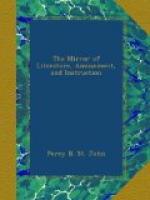[Margaret of Anjou sinks amidst the ruin of her hopes, and dies in her chair amidst a scene of royal festivity:]
To close the tale, about three months after the battle Nancy, the banished Earl of Oxford resumed his name of Philipson, bringing with his lady some remnants of their former wealth, which enabled them to procure a commodious residence near to Geierstein; and the Landamman’s interest in the state procured for them the right of denizenship. The high blood, and the moderate fortunes, of Anne of Geierstein and Arthur de Vere, joined to their mutual inclination, made their marriage in every respect rational. Arthur continued to prefer the chase to the labours of husbandry, which was of little consequence, as his separate income amounted, in that poor country, to opulence. Time glided on, till it amounted to five years since the exiled family had been inhabitants of Switzerland. In the year 1482, the Landamman Biederman died the death of the righteous, lamented universally, as a model of the true and valiant, simple-minded and sagacious chiefs, who ruled the ancient Switzers in peace, and headed them in battle. In the same year, the Earl of Oxford lost his noble Countess.
But the star of Lancaster, at that period, began again to culminate, and called the banished lord and his son from their retirement, to mix once more in politics. A treasured necklace of Margaret was then put to its destined use, and the produce applied to levy those bands which shortly after fought the celebrated battle of Bosworth, in which the arms of Oxford and his son contributed so much to the success of Henry VII. This changed the destinies of De Vere and his lady; and the manners and beauty of Anne of Geierstein attracted as much admiration at the English Court as formerly in the Swiss Chalet.
[1] The word Wehme, pronounced
Vehme, is of uncertain derivation,
but
was always used to intimate this inquisitorial and
secret
Court.
The members were termed Wissenden, or Initiated,
answering
to the modern phrase of Illuminati.
[2] Baaren-hauter,—be
of the Bear’s hide,—a nickname for
a
German
private soldier.
* * * * *
THE SELECTOR AND LITERARY NOTICES OF NEW WORKS.
* * * * *
LORD BYRON.
Mr. Nathan, the musical composer, has just published a pleasant volume of “Fugitive Pieces and Reminiscences of Lord Byron,” with a new edition of the celebrated “Hebrew Melodies,” and some never before published, of which the following are three, with Mr. Nathan’s Notes:—




